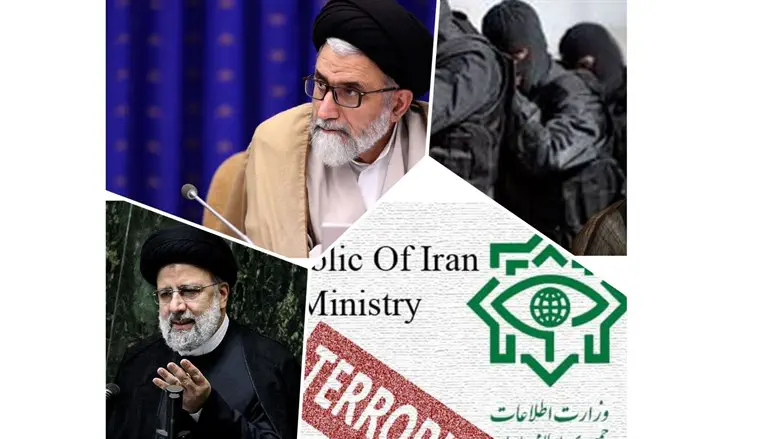
The UN allowed Ebrahim Raisi to address its General Assembly althugh Iran's President is sanctioned by the U.S. Office of Foreign Assets Control in accordance with Executive Order 13876, accused of crimes against humanity by international human rights organizations and United Nations special rapporteurs themselves..Israeli ambassador Gilad Erdan was accosted roughly by security personnel for holding up a picture of Mahsa Amini as Raisi began to speak and as Israeli diplomats left the hall. But Raisi only scratches the surface of Iranian ruthlessness.
In the geopolitical arena, the United States' intelligence community has long recognized Iran's Ministry of Intelligence and Security (MOIS) as a significant intelligence apparatus intertwined with the criminal mullahs who govern Iran. This establishment, MOIS, has been directly linked to the loss of many CIA officers over the years, a testament to its ruthless operations.
The United States, in response to these egregious actions, has consistently imposed sanctions on MOIS, emphasizing the severity of its activities. On September 18, 2023, invoking authorities granted by the Levinson Act and Executive Order 14078, the US designated MOIS for its involvement in the wrongful detention of U.S. citizens. Prior to this, on September 9, 2022, sanctions were imposed on Iran’s intelligence ministry and its chief, citing their alleged involvement in malicious cyberattacks against the U.S. and its allies.
To comprehend the present, one must revisit history, notably the Cold War era, when Iran was under the sway of an imperialist monarchy. During this time, intelligence collaboration between Iran's prestigious SAVAK, the CIA, and Israel’s Mossad was a stark reality, even as the Soviet KGB sponsored and manipulated Islamic and Marxist terrorist groups.
However, a pivotal moment came in January 1979 when the Shah of Iran, a loyal Western ally, was ousted, and the Islamic Revolution gripped the nation. Astonishingly, the CIA failed to accurately analyze the factors leading to Khomeini's ascent, thus inadvertently contributing to the rise of radical Islam in Iran.
Following the revolt, Iran descended into the clutches of radical Islam, marking the onset of the brutal mullahs' reign. CIA stations in Iran were shuttered, and the KGB seized an opportunity, infiltrating the nation's military and security apparatus. The troubled times, as is well known, persist to this day.
The Ministry of intelligence, later to become MOIS, was subsequently established in 1983, amalgamating revolutionary-era intelligence units. Over the years, it evolved into a formidable force coordinating sixteen intelligence and counterintelligence bodies. Despite nominal control under the president, MOIS's ministers need approval from the Supreme Leader, reflecting the regime's theocratic grip.
Throughout its existence, MOIS has displayed a propensity for violence, assassinations, and manipulation. Under different administrations, whether reformist or hardliner, the core policies of repression and coercion remained unchanged, cementing the agency's role in supporting Islamic terrorism.
MOIS strategically utilizes all means at its disposal to protect the Islamic Republic's interests, employing infiltration, monitoring, arrests, and cooperation with foreign intelligence agencies. The infamous "Chain Murders" of Iranian dissident intellectuals during the 1990s serve as a grim reminder of MOIS's brutal operations, with the agency later claiming responsibility.
Internationally, MOIS extends its operations, creating terrorist networks, engaging in psychological warfare, and acquiring technology for Iran's military industry. Its Department of Disinformation manipulates media and disseminates misinformation to mislead international intelligence agencies.
MOIS has been involved in two types of terrorist activities—sabotage, espionage, and bombings, and the assassination of dissidents—both within and outside Iran. This transnational suppression has persisted since the inception of the Islamic Republic, intensifying even during periods marked as 'pragmatist' governments.
In light of MOIS's ruthless and manipulative activities, the international community must remain vigilant, holding the agency accountable for its transgressions. The recent sanctions imposed by the US underscore the imperative to curb MOIS's malevolent reach and protect human rights and democracy from its insidious influence. The legacy of Iran's MOIS is one of terror and subversion, and acknowledging this reality is crucial for fostering a safer world.
In the contemporary era led by Esmail Khatib, the MOIS is actively operating and orchestrating a transnational terrorist network across the Middle East and Latin America. What is particularly alarming is MOIS' concerted effort to establish numerous "sleeper cells" within the United States. I alerted my friends in the FBI based in Washington and Alabama in both 2020 and 2022 about this concerning development.
Operating under deceptive facades such as charitable organizations, religious centers, educational institutions, and Islamic centers, MOIS is diligently working to proliferate its network within the Iranian communities residing in the US and Canada. The potential activation of these sleeper cells for malicious actions, including targeted assassinations of US authorities, remains an unpredictable threat. This is indeed a significant cause for concern, given their consistent threats to the lives of American servicemen stationed across the globe.
Essentially, MOIS operates as a terrorist organization and is expected to persist in this aggressive approach. Drawing from my field research in the Middle East, it is evident that MOIS agents engage in competitive activities with intelligence agencies such as Saudi Arabia's intelligence(Al-Istikhbārāt Al-'Āmah)), Turkey's MIT(Millî İstihbarat Teşkilatı), and Israel's Mossad. However, their focus lies not in the domain of intelligence but rather in procuring support and conducting attacks through terrorist means.
The terrorist organization of MOIS, essentially functions as a spy apparatus for the Shia Islamic Caliphate in Iran, demonstrating a readiness to commit any form of crime without hesitation.
Erfan Fard is a counter-terrorism analyst and Middle East Studies researcher based in Washington, DC. He is in Middle Eastern regional security affairs with a particular focus on Iran, counter terrorism, IRGC, MOIS and ethnic conflicts in MENA. He graduated in International Security Studies (London M. University, UK), and in International Relations (CSU-LA). Erfan is a Jewish Kurd of Iran, and he is fluent in Persian, Kurdish, Arabic and English. / Follow him from this twitter account @EQFARD / The newly published book of Erfan Fard is: “The gruesome mullah” , which has been published in the USA. www.erfanfard.net
